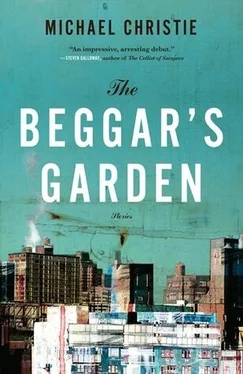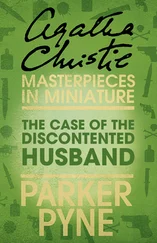Later, as she got ready for bed, she half-heartedly imagined melting all her spoons down and buying a plane ticket to Portugal, or maybe just Winnipeg, not to find Gus, but a man like him, a better one. Tucking herself in, she wondered if they had slums in Portugal and decided to keep her eye out for donated books on the subject, and also on the price of silver.
Karla, a dedicated thrift-store volunteer, had died a week ago and today was the funeral. It was held outside the city, so Bernice took the bus. After three transfers she stepped from the vehicle’s hissing doors and asked a boy in a pristine white tracksuit lazing on a bicycle with gold-plated rims where the church was. He flicked his chin grimly at what looked to Bernice like a mall at the centre of a monstrous parking lot, so vast it reminded her of the sweeping landscape paintings often donated to the store, the ones that never sold because, she figured, they amplified people’s loneliness. “That’s a church?” she said.
“No doubt,” he said. She now saw how the gold was just paint and had bled from the rims to the tire. He also had a skid of grease on his calf where it had met the chain.
Bernice thanked him and set out across the lot.
She’d always wondered if Karla was a prostitute. There was a hardness to her, a kind of cheerful vacancy, but she’d never taken for herself any of the more tartish clothes that Bernice made sure to throw away rather than give to the prostitutes who came in flocks and bought anything scanty and headlight-catching. Karla began as an occasional weekend volunteer until Bernice had offered her a regular position after she’d been impressed with her hard work. In fact, Bernice had to order her to take smoke breaks or she’d work right through them, get antsy and start dropping breakables. But what Karla did set aside for herself were children’s toys, anything that was handmade or unique. The room she lived in must have been brimming with toys. Karla had said once that she’d had a son taken from her by family services. He lived in foster care in a town called Merritt, and when Bernice asked if she’d ever thought of visiting, Karla shook her head and went for a smoke in the alley. She’d died of ovarian cancer and Bernice couldn’t help but picture the disease, in a kind of science filmstrip, X-ray view, as the accumulate of all those nasty men taking root in her, setting up shop, and Bernice shuddered as she traversed the empty spaces of the lot.
There were a handful of new cars huddled around the church. Conifers wrapped in burlap for winter stood around its brown, rectangular lawn.
“Karla made some bad decisions,” her father began in his eulogy. “We all have choices in our lives, free will and the like, but I can feel she’s happier now, at peace.”
To say someone was more content in death made Bernice’s scalp prickle. She drove her knees together until they shook. She doubted Karla was sprawled on a chaise-lounge-shaped cloud having a chuckle at how things had shaken out for her, prostitute or no.
In their tearful speeches mostly about themselves, the family mentioned little of her life but their own respective roles in her courageous battle with addiction, as if she’d sprung from her mother’s womb already decided on the perfect way to wreck her life.
“Karla was in my employ,” she said after the ceremony to the mother, whose nose hooked in the same not unattractive way Karla’s had.
“She had a job?”
“A volunteer job.”
“Umhmm.”
Bernice raked her mind for something more to tell her, this parent who should already know everything, but in truth they’d discussed their lives as much as she and Tuan had.
Bernice watched her hug the other mourners — lightly, so as not to disturb each other’s hairdo, her black shawl gently shimmering — and pictured this mother feeding baby Karla, rocking her. She marvelled at the money spent on things like piano lessons and figure skates, the time teachers spent after class unpaid to detangle in her mind the multiplication of fractions. And with all that went into the girl, that this sad display would stand as the summation of her time here crushed Bernice’s heart like a baby bird.
Bernice went to the pencil-lead-coloured coffin and pulled from her purse a wooden caterpillar that wobbled when pulled by its string. She set the toy beside her in the white satin interior. Karla had a ponytail — a style she’d never worn — and her face was puffy and spatulaed with makeup.
On her way out, Bernice turned and saw her father pick the caterpillar from her coffin and place it on a table. Then he and one of the funeral staff electric-screwdrivered the box shut, the tiny motor mewling painfully.
She couldn’t find the bus stop, and she wondered if it might have been relocated during the funeral. The sun crinkled her eyes as she walked to another parking lot — this time, she gathered from the nearly full lot, that of a real mall. She went inside to seek directions.
She entered through a store where everything was supposed to cost a dollar. Walking the cluttered aisles with not a salesperson in evidence, she recalled the scoldings Carol would dole out if a customer went thirty seconds in the shoe department without a warm greeting. The dollar store was organized with no apparent logic and the items were all tawdry bits of plastic, a fact the sign-age and overall design of the store seemed to celebrate. Woodward’s had had dollar-forty-nine days each Tuesday. They drew lineups down the block, but people still got good value for their money, and the products were made to last. She stopped in an aisle of towering stacks of plastic containers.
She wondered if Gus shopped in stores like these now. He and the owner of the green dress, or the owner of some other dress. She decided he probably did. The smell of plastic was making her light-headed. Finally, she was approached by an employee, who Bernice asked to escort her into the mall itself, where she sat on a bench. After a short rest, she located a pay phone in a dingy hallway that led to the janitorial area. She had to ask a custodian where she was before phoning for a taxi that would cost more than the thrift store made in a week.
The next morning, a pumpkin-faced man wandered in the door, pants soaked with urine — his own, Bernice hoped.
“Oh, Charlie,” she said, pulling her lips taut, guiding him to the washroom beside the overflowing storeroom. “Nothing I haven’t seen before,” she said, as she peeled away his shirt, its tails soaked and sour, and saw the man’s pink blotchy flesh hung in pouches as if melting from him. Yanking off his pants, she discovered on his shins numerous weeping sores that someone had bandaged long ago, possibly months. She tutted at the red streaks that leapt toward his groin.
“You see these?” she said, tracing one with her fingernail.
Charlie looked down at his lower half incredulously as though for the first time in a year.
“You want to lose your legs, you old goat?”
Charlie shrugged and placed his hand on her back. A pleasant sensation unrolled from where his hand pressed, akin to tickling, but warmer. She let it mix into her blood a moment, recalling how comfortably Gus fit beneath her chin when they hugged — a disparity she’d first found embarrassing but grew to adore — how they’d waited to be together until their honeymoon in Tofino, where he rented from a fishmonger he knew a smelly cedar cabin smack dab in the middle of all that water and air, and how they sat on the gravelly beach drinking wine. “Here,” he said, sweeping his arm, exhaling as if at the end of a journey, “this sea faces the right way.”
Bernice stood abruptly and Charlie’s hand swung limp to his lap. She snipped some gauze, re-dressed his shins and found him a new shirt and pair of pants, better brands and materials than she should have.
Читать дальше












